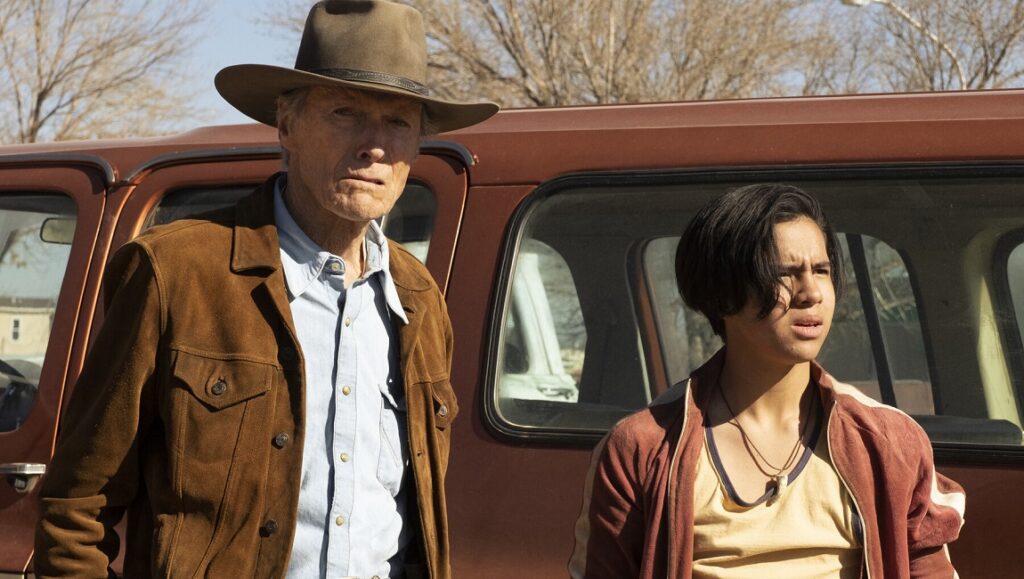Cry Macho is yet another late-career effort from Eastwood deconstructing his own legacy, neither his greatest such effort nor a throwaway piece.
Just why does Clint Eastwood — who, in case you weren’t in the know, is now 91 years old and has expressed zero interest in retiring — keep doing it? It’s a query that’s grown in prominence since the start of the current millennium, beginning with Blood Work and following through with just about every contemporaneous appearance he’s made in front of the camera since. Million Dollar Baby, Gran Torino, and, most recently, The Mule, were considered as a sort of final farewell by unimaginative critics ready to pronounce the nonagenarian dead by the end credits; in a sense, Eastwood has already been eulogized four different times over now, with each of these works serving as a more conclusive final statement of his screen legacy as he’s gracefully entered into a true elder statesman role of the last surviving figure from Hollywood’s classical studio era. Now, there’s Cry Macho, destined for yet another round of tributes while also receiving the bold distinction of being one last attempt by Clint to reckon with his iconic image — the stark emotional contraction of its title being a dead give-away. It’s also practically doomed to be laughed at by most of the general public, who will consider it saccharine and inert by most contemporary standards.
To put it kindly, Cry Macho isn’t a work motivated by innovation: the broad plot outline, one involving an elder statesman taking a young boy under his wing to teach him the ways of life, is one Eastwood’s explored before with richer, more complex results (1982’s Honkytonk Man, a Jean-Luc Godard favorite, and 1993’s A Perfect World), and it’s also as unbelievably ham-fisted as one would expect from its basic setup. Set in 1980, for really no real discernible reason other than this screenplay has been kicking around for about five decades now, Texas cowboy Mike (Eastwood) has been asked by his former boss Howard (a wooden Dwight Yoakam) to retrieve his son Rafa (Eduardo Minett) from his mother in Mexico. This all occurs within the opening 10 minutes after an introductory scene of Mike being fired by Howard a year previous; why Howard would send Mike down instead of literally anyone else under the age of 30 — or at least someone he hasn’t dismissed on account of being a complete failure — is a question of inconsequence here. And if anything, the film’s first half-hour or so is aggressively superfluous, an exposition dump that in no way attempts to simulate anything close to naturalism, and which is intended more to get things moving as quickly as possible.
This is par for the course for Eastwood at this point in time, as InRO mainstay Matt Lynch once described his late-career impulses as such: “tender, observant, simple, but often inelegant and occasionally pretty thoughtless.” There’s a clear emphasis on the “inelegant” here, as characters awkwardly blurt out their motives and stumble through some painfully tin-eared dialogue, akin to most popular entertainment from the 1950s; Eastwood, a veteran of this sorta thing, can make it work, but the less experienced cast members (read: nearly everyone else) frequently flounder under the weight of this screenplay’s pure hokum. So there’s those kinks, plus the usual Eastwood tics that have plagued even his earlier productions: the awful dad humor (“What’s Spanish for ‘irony’?’”), the racial stereotypes, his insistence on shooting everything in one take — and while the eventual love interest, a widow named Marta (Natalia Traven), is considerably older than most leading roles afforded women in mainstream motion pictures, it wouldn’t be a Clint picture if he wasn’t fucking a woman half his age.
That said, there are still some elements here that do surprise: Eastwood, never one to side-step self-aggrandizement, has never appeared weaker, less in command, less towering, less… well, “macho” than he is here. He’s consistently dwarfed in size by others — and at times, as in his first confrontation with Rafa’s mother, the scenery — as he ventures further and further into a criminal underworld he knows nothing about. He even cries on camera by the tail-end, breaking any self-imposed rules of manhood that he helped establish some 40 years previous (he does ride a horse again, but it’s pretty obvious he’s not actually on the colt). He flubs a few of his lines, but Eastwood has a clear enough read on this material — and is clearly in on the fact that he’s way too old to convincingly embody this role — which allows him to get away with it.
The film is even eventually able to situate itself into a more relaxed rhythm once the expository first leg finally ends, with little to no conflict driving the stakes (there’s a twist at one point, but it’s easily foreseeable and doesn’t alter the end goals one iota) as Eastwood’s concerns lie more with his film’s visual and atmospheric textures than with narrative progression. Ben Davis, a first-time cinematographer for Eastwood — who’s known to repeatedly work with his close stable of Malpaso staples — captures these straightforward moments with an uncharacteristic (at least for Clint) inclination toward high-key natural lighting, brightening up an already warm, overly-familiar work. It all works to make Cry Macho a sweet, pleasant motion picture from a sweet, pleasant old man (okay, maybe those descriptors aren’t exactly applicable to Eastwood), one destined to be viewed on AMC during Thanksgiving with comatose relatives and swiftly forgotten about once Clint announces his next — and what many will try to claim as his last — cinematic project.


Comments are closed.